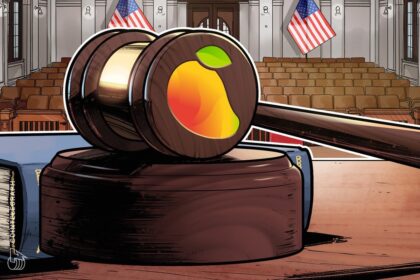Global Ledger, a company that provides a crypto Anti-Money Laundering (AML) toolset, has identified over $15 million in active reserves from crypto exchange Garantex, some of which are on the move.
According to Global Ledger’s report, a dormant Garantex Ethereum wallet began accumulating Ether (ETH) on March 6, eventually funneling $2.3 million in ETH to Tornado Cash. That wallet still holds $6.1 million in ETH, which remains stagnant.
The same pattern was found for Bitcoin (BTC) holdings, the report says. About 2.2 BTC has been bridged to the TRON network, then partially transferred to Grinex.
“The Garantex case undermines the illusion of control that many still cling to,” Global Ledger co-founder and CEO Lex Fisun told Cointelegraph. “$15 million moving freely through obscure chains and mixers isn’t a failure of law — it’s a failure of sanction enforcement.”
On March 6, Tether froze $27 million USDt (USDT) on Garantex. That same day, the exchange halted operations, claiming that “Tether has entered the war against the Russian crypto market and blocked our wallets worth more than 2.5 billion rubles [$27 million].”
In April 2022, the US Department of the Treasury’s Office of Foreign Assets Control (OFAC) became the first entity to issue sanctions against Garantex. According to the Treasury Department, the exchange had disregarded AML and other requirements imposed by some regulators on crypto exchanges. The European Union would follow with sanctions on Feb. 24, 2025.
On March 12, Garantex said founder Aleksej Bešciokov was arrested while vacationing in India with his family. He could be extradited to the United States, where he faces multiple conspiracy charges, including conspiracy to commit money laundering.
Related: US sanctions 8 crypto wallets tied to Garantex exchange and Yemeni Houthis
Russia responds to Tether freeze
On April 17, a Russian finance ministry official, Osman Kabaloev, reportedly said that the country should develop its stablecoin. The remarks came around a month after Tether orchestrated its freeze on USDt in wallets linked to Garantex.
“We do not impose restrictions on the use of stablecoins within the experimental legal regime,” Kabaloev told TASS, a state-owned news agency. “Recent developments have shown that this instrument can pose risks for us.”
On April 24, the Russian finance ministry and central bank reportedly revealed that they planned to launch a cryptocurrency exchange for “super-qualified” investors.
Magazine: Tornado Cash 2.0 — The race to build safe and legal coin mixers










